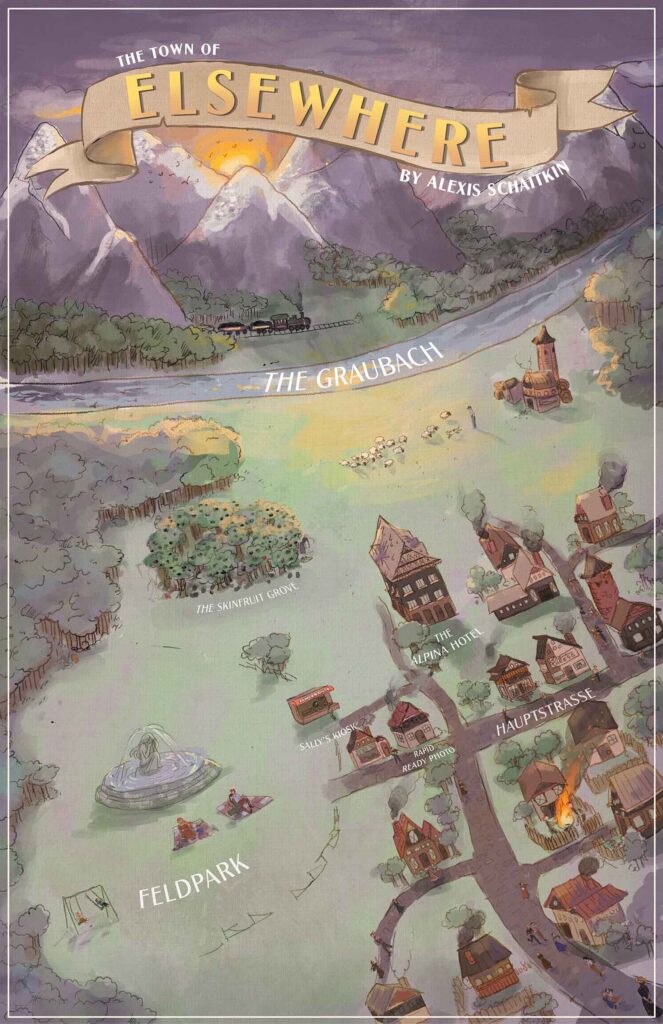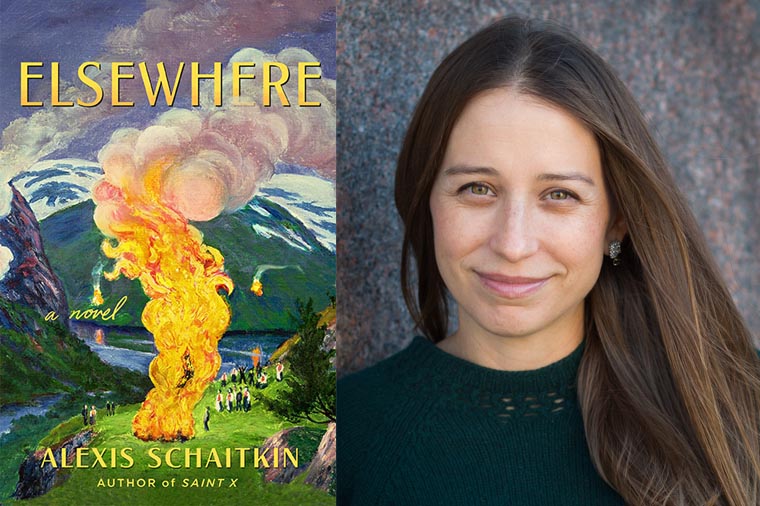From the author of Saint X comes Elsewhere, a story in which girls become wives, wives become mothers, and some of them, quite simply, disappear. Celadon sat down with author Alexis Schaitkin to discuss her singular new novel and the timeless struggles with which it grapples.
How did you come up with the idea for Elsewhere?
Elsewhere emerged as the solution to what had seemed to me like an unsolvable problem. I wanted to write a novel about motherhood, but I was also so tired of mothering all day that the notion of writing about it too was painful. My writing time was my escape, and I didn’t want to spend it thinking about the same tasks and tedium I dealt with all the other hours of the day. I wanted to give myself the freedom to explore more essential and mysterious aspects of motherhood: the experience of loving someone so much, how euphoric and also how dangerous it can feel. The timeless questions motherhood raises: How much should you let yourself lose yourself in this role? How much of yourself should you hold back from your child to maintain some separate identity? How do you live with the inevitable truth that you will harm your child, some way, somehow, no matter how fiercely you love them?
I had also, for years, been circling this vision I had of a small, isolated town. It was just a notion, very unformed: a town that keeps itself secret from the rest of the world because some terrible, dark thing happens there, and they know people elsewhere would never understand why they have chosen to remain in the place where this thing happens, why instead of running from it, they have embraced it and built their lives around it.
And somehow the idea came to me that the dark, terrible thing this town lives with, its “affliction,” is that mothers disappear. Every so often, the community wakes up in the morning and a mother is simply gone, vanished. And they believe there is a logic to this affliction, that the women who disappear are chosen because there is something out of balance in the nature of their love for their children.
I knew right away that this was the idea, because it would allow me to write directly into the heart of my own fascinations. Soon after, the narrator, Vera, came to me. She’s the daughter of a vanished mother, and she takes the reader with her on her journey from girlhood to motherhood, a journey that is harrowing but that feels totally ordinary to Vera, because this town is all she knows.
This is a novel about how becoming a mother transforms—at once deepens and threatens—a woman’s identity. It’s about self-revelation. But it’s also about community, about group identity, and the allure and danger of losing yourself in something much larger than yourself.
Elsewhere is much more of a speculative novel than your previous book, Saint X. What made you decide to move into this genre?
I knew I was diving into a story that was very different from Saint X, moving from “thriller” to “speculative.” But while these books may be categorized in different genres, I think there’s so much that connects them. Saint X revolves around a girl’s mysterious death. Elsewhere revolves around the mysterious disappearance of mothers. Both books present as mysteries from the start, but as readers immerse themselves in the story, my hope is that they realize the stakes are less about solving the mystery than about seeing how these characters live with it. How do we live alongside something that we will never understand? How do we know who we are, how do we live and how do we love, when some of the most fundamental parts of ourselves—things we think we need—are unknown to us, and always will be? I like to think these books are part of their own little invented genre. They’re inverted mysteries, almost.
I think because of that, Saint X and Elsewhere, despite their wildly different settings, genres, and themes, share a certain feel, a common rhythm. They have the page-turner quality of a mystery, but they’re also introspective and meditative. I always want to hit that balance, because books that do both are such a joy to me as a reader.
You paint a vivid depiction of the fictional town in which Vera lives. What inspired this unique setting? And how did you go about building this world?
Fifteen years ago, I was traveling alone—I don’t even want to say where I was, because the town in Elsewhere isn’t meant to be set in any real part of our world. For a few nights, I stayed at a guesthouse in the mountains, set on the grounds of what had once been a small boarding school. It was like something out of a storybook: ivy growing over everything, thick moss on the rooftops, stone passageways. Every day as afternoon drew to a close, clouds settled in and just filled the air. I have this distinct memory of sitting in the library, on this sofa that was damp because everything there was damp, always, and the doors had been left open and I could see the clouds flowing right into the room.
I remember taking photographs while I was there, but this was before we all uploaded every picture to social media, and those pictures are lost now. Which is ironic, because photography is a major motif in Elsewhere. The town is a creation inspired by long-ago memories.
I wrote the first draft of Elsewhere during the early months of the pandemic, when we were locked down at home with our toddler. I was writing while my husband cared for our son, and my desk is in the hallway, so I could hear the laughing, the crying, the snacks, everything. To shut that all out and get myself into the headspace to evoke this town, I listened to the same song every morning when I sat down to write: Bedrich Smetana’s “The Moldau.” It’s just this gorgeous, moody piece, and I never grew tired of it. It was my way of transporting myself to the town.

Elsewhere tells a story that is both timeless and distinctly relevant, as the pandemic has shed light on many struggles that mothers face. What do you think new mothers, seasoned mothers, and mothers-to-be will take away from this novel?
The affliction in Elsewhere has many resonances with the challenges mothers in our own world face. The townspeople scrutinize and judge mothers, while mothers live in a constant state of hypervigilance, terrified that their love contains too much of this or too little of that. Mothers occupy the very center of the town’s attentions, yet when a mother vanishes, we see that they are also easily thrown away, sacrificed. I think a lot of mothers will relate to occupying those contradictory positions. Mothers in our own society are seen as so important and powerful, yet at the same time, there is such suspicion of mothers. We are valorized and discounted in the same breath.
But the affliction isn’t a straight-up metaphor for contemporary motherhood. It was really important to me that the novel resist being read simply as allegory or commentary. I want the world I created, and Vera’s story, to matter on its own terms, to feel real and urgent and emotional for the reader. My hope is that readers can just immerse themselves in this strange community and surrender to the world of the story.
One could say that Elsewhere is as much about mother–child relationships as it is about women’s self-identities. How did your own mother–child relationships impact your telling of this story?
There aren’t any characters in Elsewhere who are very much like my mother or me or my children, yet the power and intimacy of those relationships are the heart of this story.
The early months of the pandemic were so challenging, but they also heightened and intensified my relationship with my son right when I was in the throes of writing Elsewhere. Whenever I wasn’t writing, I was with my son. We spent hours alone together, often in the woods, nobody else in sight. By the end of the day, I could hardly say where I ended and he began. It felt like we became something together that was… not more than the sum of our parts, but different; our relationship was like this strange creature that was neither of ours to control. All of this reminded me of my relationship with my own mother when I was a young girl, that tangled, all-encompassing connection between a parent and a young child.
I had started Elsewhere before the pandemic, but until those locked-down months, I was still searching for the heart of the story. I found it in the woods with my son. It’s the strangeness and singularity of every parent–child bond, the secret world you inhabit together, a world nobody else can understand, and the way the ecstasy of inhabiting that world lives alongside this constant questioning: Is this love I’m giving my child good? Is it right, is it balanced?

Elsewhere by Alexis Schaitkin is available June 28th, everywhere books are sold.






